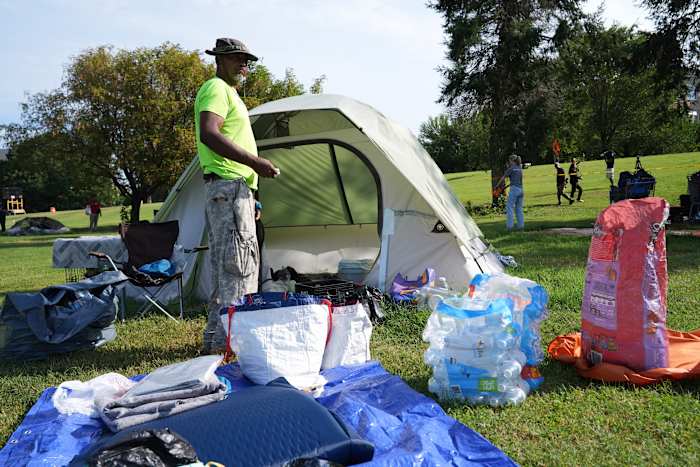Is Trump's 'Safe and Beautiful' Plan for DC Homeless Camps Really Helping?

Understanding the Dynamics of Homelessness in Washington D.C.
In the heart of Washington D.C., a complex narrative unfolds as individuals grapple with the harsh realities of homelessness. The recent events surrounding the enforcement of homelessness clearance have shed light on the multifaceted issues faced by those living in encampments. Personal stories from individuals like Ms. Jay and George exemplify the struggles, resilience, and harsh realities of life on the streets. As authorities ramp up efforts to clear out these encampments, the broader implications of such actions on the homeless population and society at large deserve careful examination.
The Human Stories Behind the Headlines
Amidst the political backdrop, the human stories often get overlooked. Individuals like Ms. Jay, who describe their experiences with homelessness through their own unique lenses, highlight the importance of understanding the human aspect of this pressing issue. Ms. Jay's proactive approach—packing her belongings in anticipation of eviction rather than waiting for authorities—illustrates the survival instincts developed by those living on the margins. Her story reflects not only a personal struggle but also a broader commentary on societal attitudes toward homelessness.
The Reality of Living in Encampments
Living in encampments is not just a physical existence; it is an emotional and psychological battle as well. Many individuals, like Andrew and Jesse, express feelings of fear, insecurity, and frustration as they navigate the complexities of their daily lives. The fear of eviction adds another layer of stress to their already challenging situations. The presence of law enforcement during these evictions can amplify feelings of vulnerability and helplessness among the homeless population.
The Role of Law Enforcement
The role of law enforcement in addressing homelessness is a contentious issue. While some argue that clearing encampments is necessary for public safety and urban cleanliness, others, like Wesley Thomas, emphasize the need for compassion and understanding. The approach taken by authorities can significantly impact the lives of those affected. The recent collaboration between federal and local law enforcement to dismantle encampments raises questions about the effectiveness and humanity of such measures.
Impact of the "Making D.C. Safe and Beautiful" Task Force
President Trump's initiative, “Making D.C. Safe and Beautiful,” aims to clean the streets of crime and homelessness. However, the implementation of this task force has sparked controversy. Critics argue that the strategy disproportionately targets vulnerable populations rather than addressing the root causes of homelessness. The focus on aesthetics over human dignity raises ethical questions about how society values its most marginalized members.
Community Perspectives
Community leaders, including those from the Episcopal Diocese of Washington, have voiced concerns regarding the treatment of homeless individuals. They highlight the importance of viewing these individuals not as problems to be solved but as fellow human beings deserving of dignity and respect. This perspective challenges the narrative that equates homelessness with lawlessness and emphasizes the need for empathy in policymaking.
Policy Implications and Solutions
Addressing homelessness requires a multifaceted approach that goes beyond mere eviction. Policymakers should consider long-term solutions that include affordable housing, mental health support, and job training programs. The insights from advocates like Wesley Thomas underscore the need for a shift in perspective—recognizing that those experiencing homelessness come from diverse backgrounds and possess a range of skills and capabilities.
Investing in Support Systems
Investment in robust support systems can provide individuals with the resources they need to rebuild their lives. Initiatives that promote affordable housing, access to healthcare, and job placement services can significantly reduce the number of individuals experiencing homelessness. Furthermore, community-based organizations can play a crucial role in providing immediate assistance and long-term support for those in need.
The Importance of Advocacy
Advocacy plays a critical role in shaping public perception and influencing policy changes regarding homelessness. Organizations like Miriam's Kitchen provide invaluable support to individuals experiencing homelessness, helping them navigate the challenges they face. Advocacy efforts can lead to greater awareness and understanding of homelessness, challenging stereotypes and prompting societal change.
Creating a Compassionate Community
Building a compassionate community involves recognizing the humanity of every individual, regardless of their circumstances. Initiatives aimed at raising awareness and fostering dialogue about homelessness can create a more inclusive society. By prioritizing empathy and understanding, communities can work together to develop solutions that address the root causes of homelessness rather than simply treating the symptoms.
Frequently Asked Questions
What are the main causes of homelessness in Washington D.C.?
Homelessness in Washington D.C. is influenced by various factors, including lack of affordable housing, unemployment, mental health issues, and substance abuse. Systemic issues such as income inequality and the rising cost of living also contribute significantly to the crisis.
How can communities help the homeless population?
Communities can assist homeless individuals by supporting local shelters, donating to food banks, volunteering at organizations that provide services to the homeless, and advocating for affordable housing policies. Engaging in community outreach and fostering empathy can also make a significant difference.
What role does mental health play in homelessness?
Mental health issues are prevalent among the homeless population, with many individuals suffering from untreated conditions. Access to mental health services is crucial for helping these individuals regain stability and reintegrate into society. Addressing mental health as part of a comprehensive approach to homelessness is essential for effective solutions.
Conclusion
The struggle against homelessness in Washington D.C. is a complex issue that requires compassion, understanding, and systemic change. The stories of individuals like Ms. Jay, George, and Wesley Thomas remind us of the human cost of policy decisions. As communities continue to grapple with the realities of homelessness, fostering empathy and advocating for meaningful solutions must be a priority. How can we work together to create a society where every individual has a place to call home?
#Homelessness #Advocacy #Compassion
```Published: 2025-08-15 04:43:26 | Category: Trump GNEWS Search



